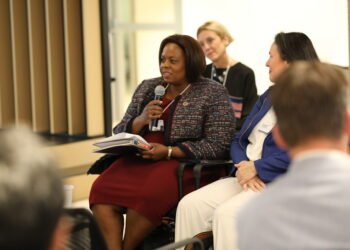What if the most effective solution to global poverty isn’t complicated aid programs, but simply giving cash directly to those in need?
This provocative question lies at the heart of Rory Stewart’s transformative work in international development. As former Secretary of State for International Development and Minister, Stewart brings unique government experience to his humanitarian efforts.
His collaboration with GiveDirectly represents a powerful shift in how we approach poverty reduction worldwide. This partnership combines Stewart’s political insights with innovative direct cash transfer methodology.
The evidence-based approach challenges traditional aid models and offers new hope for meaningful change. This unique collaboration demonstrates how government experience can inform effective nonprofit leadership.
Key Takeaways
- Rory Stewart’s government background informs his current humanitarian work
- GiveDirectly uses direct cash transfers as an innovative aid approach
- The partnership combines political expertise with evidence-based methodology
- This collaboration challenges traditional international development models
- The approach shows significant potential for global poverty reduction
- Stewart’s transition from minister to nonprofit leader brings unique insights
Introducing a Unique Partnership in Global Development
How can government expertise transform humanitarian aid for maximum global impact? The partnership between Rory Stewart and GiveDirectly answers this question with groundbreaking results.
This collaboration brings together deep political experience with innovative poverty solutions. Stewart’s background as Secretary of State for International Development provides crucial government insights.
GiveDirectly’s mission focuses on direct cash transfers to those in need. The organization believes people know best how to improve their own lives.
Stewart’s government experience perfectly complements this approach. His understanding of international systems helps scale effective solutions across the world.
The partnership represents a powerful shift in development thinking. It combines political wisdom with evidence-based humanitarian methods.
This unique alignment challenges traditional aid models that often involve complex bureaucracy. Instead, it prioritizes direct support and local decision-making.
Together, they offer a fresh vision for international development. Their work demonstrates how different sectors can collaborate for greater impact.
The global reach of this partnership shows significant potential. It operates across multiple continents, addressing poverty in diverse communities.
This collaboration stands out in the humanitarian innovation landscape. It brings a unique value proposition to the entire development sector.
Rory Stewart: From Diplomat to Development Revolutionary
How does a seasoned diplomat transform into a groundbreaking force in humanitarian aid? The journey of this former British official reveals a remarkable evolution in global development thinking.
Early Career and Diplomatic Service
His international career began with significant postings across Southeast Europe and Asia. Serving as a diplomat in Indonesia provided deep cultural understanding.
Later appointment as British Representative to Montenegro further expanded his global perspective. These experiences built crucial foundations for understanding international relations.
His diplomatic service established practical knowledge of cross-cultural communication and governance systems. This background proved invaluable for later development work.
Political Ascension and Ministerial Roles
Election to Parliament in 2010 marked a new chapter in public service. Representing the Conservative Party, he brought unique international experience to domestic politics.
Ministerial appointments followed, covering diverse portfolios including environmental and international development matters. His role as Secretary of State for International Development provided particular relevance.
This position offered direct insight into traditional aid mechanisms and their limitations. Government experience shaped his critical perspective on development effectiveness.
Transition to Humanitarian Work
The shift from government service to nonprofit leadership represented a natural progression. His diplomatic and ministerial background informed this transition perfectly.
Motivation came from recognizing the potential for more effective poverty solutions. Direct cash transfer approaches aligned with his belief in local empowerment.
This move combined political wisdom with practical humanitarian innovation. His unique background continues to influence global development strategies today.
The Genesis of GiveDirectly’s Innovative Approach
Why would anyone trust people in poverty to make their own financial decisions better than aid organizations? This fundamental question drove GiveDirectly’s creation and continues to shape its revolutionary methodology.
The organization emerged from a simple yet powerful insight. Traditional aid often creates complex systems that may not serve recipients effectively.
GiveDirectly’s founders recognized a different path forward. They believed direct financial assistance could transform international development outcomes.
Unconditional Cash Transfers: A Radical Concept
The concept of unconditional cash transfers challenged decades of development orthodoxy. Most aid programs involved conditional requirements and intermediary organizations.
GiveDirectly proposed something remarkably simple. They would transfer funds directly to people living in extreme poverty.
This approach represented a philosophical shift in humanitarian thinking. It trusted recipients to prioritize their own needs better than external experts could.
The model eliminated bureaucratic layers that often dilute aid effectiveness. Recipients gained complete autonomy over how to use the funds.
This radical approach initially faced skepticism from the development community. Many questioned whether people would use money wisely without guidance.
Evidence-Based Humanitarian Methodology
GiveDirectly built its approach on rigorous research and data analysis. They committed to testing and validating their methodology through controlled studies.
Multiple randomized controlled trials demonstrated impressive results. Recipients used funds for essential needs, education, and productive investments.
The evidence consistently showed positive outcomes across diverse contexts. Cash transfers led to improved nutrition, better housing, and increased economic activity.
This evidence-based foundation convinced many skeptics in the international development field. The data proved more effective than traditional aid approaches in many cases.
Research findings influenced broader conversations about state international development policies. The methodology’s success prompted reevaluation of conventional wisdom.
GiveDirectly’s approach demonstrated remarkable scalability potential. The simple transfer mechanism could be replicated across different regions and cultures.
This model continues to evolve based on ongoing research and feedback. It represents a significant advancement in humanitarian assistance methodologies.
Stewart’s Appointment as President of GiveDirectly
When traditional politics meets innovative humanitarianism, what transformative potential emerges for global poverty reduction? The August 2022 announcement revealed a significant leadership transition that would shape international aid for years to come.
This strategic appointment brought together decades of government service with cutting-edge humanitarian methodology. The organization gained a leader with deep understanding of international systems and development challenges.
Bringing Government Experience to Nonprofit Leadership
The former minister brought unparalleled insights from his time in government. His experience as Secretary of State for International Development provided crucial understanding of aid mechanisms.
This background informed his approach to nonprofit leadership. He understood both the limitations and opportunities within traditional development systems.
His ministerial roles equipped him with unique perspective on cross-border cooperation and policy implementation. This knowledge proved invaluable for scaling innovative solutions across different regions and cultures.
The transition from government to nonprofit represented a growing trend in cross-sector leadership. Professionals with political experience bring valuable skills to humanitarian organizations.
Strategic Vision for Global Aid Transformation
The new president developed a comprehensive strategy based on his government background. His vision combined political wisdom with evidence-based humanitarian approaches.
This strategic direction emphasized efficiency and direct impact. It focused on reducing bureaucratic barriers while maximizing recipient autonomy.
His government experience enabled sophisticated understanding of international development ecosystems. This informed smarter partnerships and more effective resource allocation.
The leadership transition signaled a new era for innovative poverty solutions. It demonstrated how diverse professional backgrounds can enrich humanitarian work.
This appointment continues to influence global conversations about aid effectiveness. It represents a powerful model for future leadership transitions in the development sector.
Revolutionizing Aid Through Direct Cash Distribution
How can we transform international development by putting money directly into the hands of those who need it most? GiveDirectly’s groundbreaking approach challenges decades of conventional wisdom in humanitarian assistance.
This innovative model represents a fundamental shift in how we conceptualize poverty reduction. It moves beyond traditional bureaucratic systems to create more efficient, respectful aid delivery.
Eliminating Bureaucratic Middlemen
Traditional aid often involves multiple layers of administration. Each layer adds cost and complexity while reducing the actual funds reaching recipients.
GiveDirectly’s method cuts through these bureaucratic structures completely. Funds move directly from donors to those living in poverty.
This direct approach significantly reduces operational overhead and administrative expenses. More money reaches people who actually need support.
The elimination of intermediary organizations creates remarkable efficiency gains. Resources previously spent on management now go directly to poverty reduction.
This streamlined model challenges conventional state international development approaches. It demonstrates how simplicity can outperform complex systems.
Empowering Recipients Through Financial Choice
Cash transfers give people complete autonomy over their financial decisions. Recipients know their own needs better than any external organization.
This empowerment creates psychological benefits beyond mere financial support. People gain dignity and control over their circumstances.
Financial autonomy leads to more appropriate and effective spending choices. Families prioritize what matters most to their specific situation.
Research shows recipients make sensible decisions with direct cash assistance. They invest in nutrition, education, housing, and small businesses.
The cost-effectiveness surpasses many traditional international development models. Direct transfers often achieve greater impact per dollar spent.
Scalability challenges exist but innovative solutions continue to emerge. Mobile banking technology enables efficient distribution across diverse regions.
This approach aligns with broader movements toward recipient-centered aid. It represents the future of thoughtful, respectful humanitarian assistance.
Measurable Impact on Global Poverty Reduction
Can direct cash transfers truly transform lives across the globe? The evidence from GiveDirectly’s programs shows remarkable results in reducing poverty through simple, dignified assistance.
This approach has demonstrated significant impact across diverse regions and cultures. The measurable outcomes challenge conventional wisdom about aid effectiveness.
Case Studies: Success Stories Across Continents
African communities show impressive results from direct cash programs. Families in Kenya used funds for home improvements and small businesses.
Latin American recipients invested in education and healthcare. These choices created long-term benefits beyond immediate financial relief.
Asian families demonstrated remarkable economic mobility through strategic investments. Many started sustainable enterprises that provided ongoing income.
Each case study reveals unique adaptations to local contexts. The flexibility of cash transfers allows for personalized poverty solutions.
Statistical Evidence of Program Effectiveness
Long-term data collection shows sustained positive outcomes. Programs have tracked recipients over multiple years with consistent results.
Poverty metrics indicate significant reductions in economic hardship. Household incomes increased while debt levels decreased.
Health indicators improved across all studied regions. Nutrition and medical access showed measurable enhancement.
Educational attainment rose substantially among recipient families. Children stayed in school longer with better resources.
Economic mobility statistics revealed upward movement across generations. The programs created lasting change rather than temporary relief.
Comparative analysis shows advantages over traditional development approaches. Cash transfers often achieve better results with lower overhead costs.
The evidence base continues growing through ongoing research studies. Each new dataset reinforces the methodology’s effectiveness.
Scalability potential becomes clearer with each successful implementation. The model works across different economic and cultural contexts.
This approach contributes meaningfully to global poverty reduction targets. It offers a practical path toward achieving international development goals.
Challenges and Criticisms of Unconditional Aid
Is giving money directly to people in poverty too simple to work effectively? This question lies at the heart of many criticisms surrounding unconditional cash transfers.
Despite strong evidence supporting direct aid, several concerns persist within the international development community. These objections require careful examination and thoughtful responses.
Rory Stewart’s background in government provides unique perspective on addressing these challenges. His experience helps navigate complex debates about aid effectiveness.
Addressing Concerns About Cash Misuse
Many critics worry recipients might misuse direct cash transfers. Common concerns include spending on alcohol, tobacco, or other non-essential items.
GiveDirectly addresses these concerns through robust monitoring systems. They track spending patterns across diverse communities and cultural contexts.
Research consistently shows most recipients make responsible financial decisions. Families prioritize basic needs, education, and productive investments.
The organization’s data collection methods provide transparent accountability. Regular reports demonstrate how funds actually get used in practice.
Stewart’s political experience helps frame these responses effectively. He understands how to communicate evidence to skeptical audiences.
Comparative Analysis with Traditional Aid Models
Traditional aid often involves complex delivery systems with multiple intermediaries. These approaches can create significant administrative overhead and delays.
Direct cash transfers show clear advantages in efficiency and impact measurement. Comparative studies reveal higher cost-effectiveness than many conventional programs.
Cash-based assistance demonstrates superior outcomes in many poverty reduction metrics. Recipients show greater economic mobility and improved living standards.
The Conservative Party background of Stewart brings valuable insight into policy comparisons. His government experience informs understanding of different aid approaches.
Over time, the evidence supporting direct transfers has grown substantially. More development organizations now incorporate cash-based elements into their programs.
This evolution reflects changing perspectives within international development circles. The conversation continues evolving as new data emerges.
The Future of Global Aid: Stewart’s Vision
What does the future hold when political expertise meets innovative cash transfer solutions? The vision of this former government leader points toward a transformed international development landscape.
His approach combines practical government experience with evidence-based humanitarian methods. This unique perspective shapes a comprehensive strategy for global poverty reduction.
Scaling Direct Cash Transfer Programs
The former Secretary of State brings crucial insights about program expansion. His government background informs realistic scaling strategies across different regions.
Scalability challenges receive thoughtful attention based on ministerial experience. Infrastructure limitations and cultural differences factor into implementation plans.
Mobile technology integration represents a key component of expansion strategy. Digital platforms enable efficient distribution while maintaining personal dignity.
Partnership development draws on diplomatic skills from government service. Cross-sector collaborations enhance program reach and effectiveness.
Monitoring systems ensure quality control during expansion phases. Data-driven adjustments maintain program integrity across diverse implementations.
Influencing International Development Policy
Policy influence represents another critical aspect of the overall vision. Government experience provides unique understanding of policy mechanisms.
The former minister employs diplomatic approaches to advocacy work. Relationship-building skills facilitate conversations with policy makers.
Evidence presentation strategies draw on political communication experience. Data gets framed in ways that resonate with different audiences.
International development frameworks undergo careful analysis and critique. Proposed reforms focus on increasing efficiency and recipient autonomy.
Global trends in humanitarian assistance receive thoughtful consideration. The vision adapts to evolving contexts while maintaining core principles.
Systemic change potential remains a central focus of policy efforts. The approach seeks transformation beyond individual program success.
Conclusion: Redefining Humanitarian Assistance for a New Era
This unique partnership represents a fundamental rethinking of global aid delivery. Rory Stewart’s Conservative Party background and government experience combine with innovative cash transfer methods.
The diplomat’s time in international service informs this transformative approach. His political wisdom helps shape effective humanitarian strategies.
This collaboration signals a paradigm shift toward more respectful and efficient poverty solutions. It demonstrates how diverse expertise can create lasting change in development systems.
The future of aid looks brighter with this evidence-based, dignity-focused model leading the way.
FAQ
What is GiveDirectly’s approach to humanitarian aid?
GiveDirectly provides unconditional cash transfers directly to people living in extreme poverty. This innovative method bypasses traditional aid structures, allowing recipients to decide how best to meet their own needs.
How did Rory Stewart transition from politics to humanitarian work?
After serving as a Member of Parliament and Secretary of State for International Development, Stewart joined GiveDirectly as president. He brought his government experience to transform global aid delivery through direct cash programs.
What evidence supports the effectiveness of direct cash transfers?
Multiple studies across Africa and Asia show that unconditional cash transfers significantly improve household income, nutrition, and economic stability. Recipients typically make thoughtful financial decisions that benefit their families.
How does GiveDirectly ensure donations reach intended recipients?
The organization uses digital payment systems and thorough verification processes to deliver funds directly to individuals. This approach minimizes administrative costs and prevents resources from being diverted.
What challenges does the direct cash model face?
Some critics worry about potential misuse of funds or inflation in local economies. However, research consistently shows these concerns are largely unfounded, with most recipients using money responsibly.
How is Stewart influencing global development policy?
Through his leadership at GiveDirectly, Stewart advocates for evidence-based aid reform. His work demonstrates how direct cash transfers can complement or replace traditional development programs.





